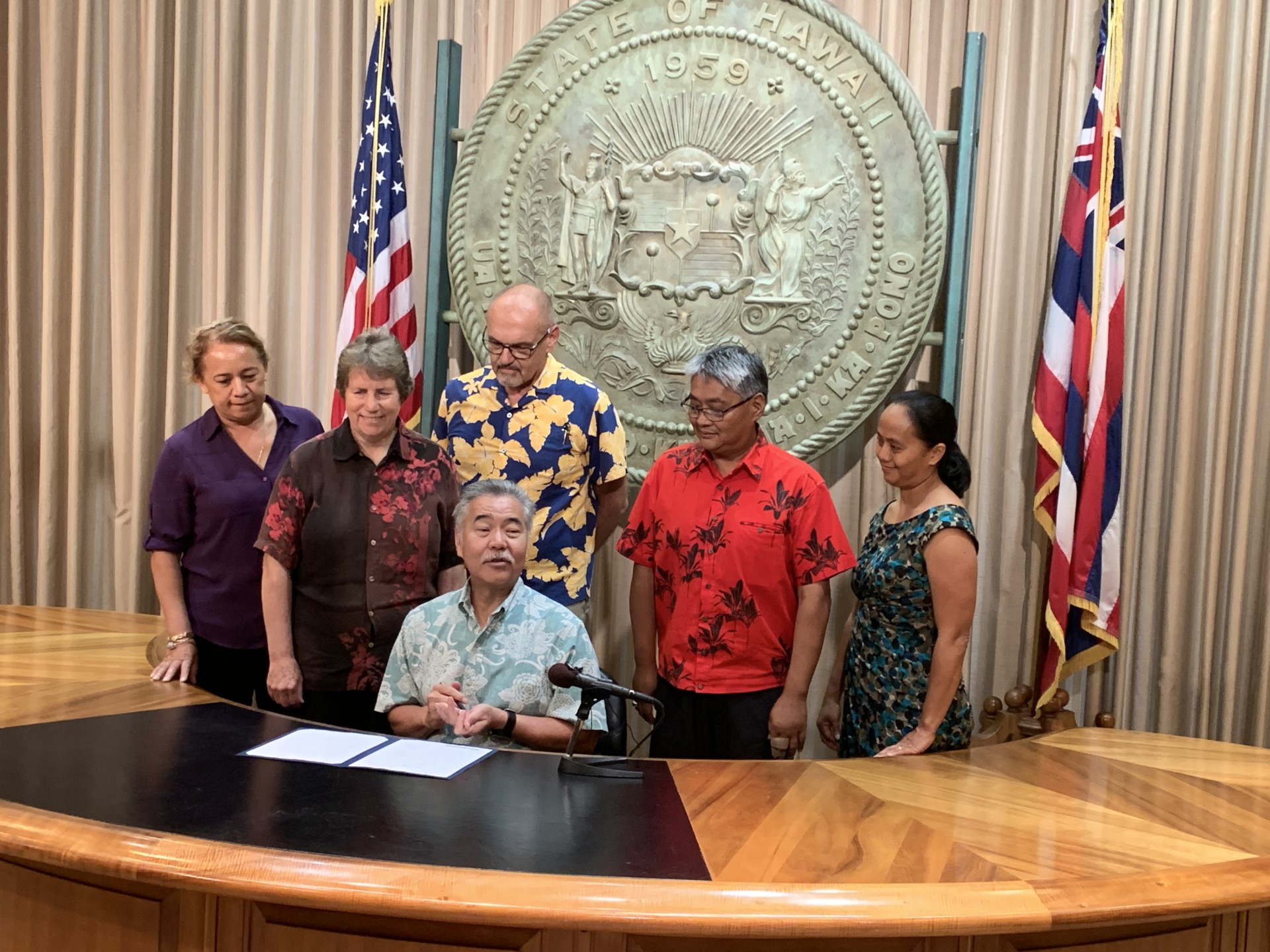7/8/2019
Governor David Ige signs SB 1394 to establish a state tax credit to support rehabilitation of historic properties. Mahalo to Governor Ige, State Historic Preservation Officer Suzanne Case, SHPD Administator Alan Downer and leaders in the House and Senate for supporting this preservation incentive.
4/30/19:
The Hawai‘i State Legislature approved a 30% credit against state income taxes for costs associated with rehabilitation of historic properties. SB 1394 was passed by both the Senate and the House of Representatives on April 30. It will be enrolled to Governor David Ige, who has 30 days to indicate if he will allow it to become law. If approved by the Governor, the act will take effect on July 1, 2019. Once enacted, the historic rehabilitation tax credit will provide an important incentive to developers, property owners and financial institutions involved in preserving historic buildings and providing affordable housing.
Tax credit programs for rehabilitation of historic properties have been used at the federal level and by 38 other States that have adopted laws creating credits against state taxes to provide incentives for the appropriate rehabilitation of historic buildings. While the details of the programs vary state by state, preservation tax credits have universally been shown to be effective, especially when coupled with the federal historic tax credit available to income-producing historic properties.
The Hawai‘i state tax credit is enabled by legislation and then the program will be detailed in rules promulgated by both the Department of Taxation and the Department of Land and Natural Resources. Key program elements include:
- criteria establishing which structures qualify for the credit;
- standards to ensure that the rehabilitation preserves the historic and architectural character of the building;
- a method for calculating the value of the credit awarded, reflected as a percentage of the amount expended on that portion of the rehabilitation work that is approved as certified rehabilitation;
- a minimum amount, or threshold, required to be invested in the rehabilitation; and
- a mechanism for administering the program, involving the state historic preservation division and the department of taxation.
The amount of the cumulative credit is capped at $1,000,000 per year. It sunsets in five years, unless further legislative action extends it before then.
Congratulations to all of the partners who worked to pass this landmark legislation. We look forward to it providing additional support and incentives for saving historic properties.
4/19/19:
SB 1394 and HB 1533, establishing a historic preservation credit against state income tax, are still alive at the State Legislature. HHF is actively supporting these measures. They have passed both chambers and are waiting for conference committee members to be assigned and to reconcile differences. We are very hopeful that a bill will pass before the legislature adjourns on May 2.
3/11/19: HISTORIC PRESERVATION BILLS TO BE HEARD TUESDAY, MARCH 12
Both Historic Preservation Tax Credit bills will have public hearings on Tuesday, March 12 in their subject matter committees in the Capitol.
SB 1394 will be heard by the House of Representative’s HOUSING Committee at 9:30 a.m. in Room 423.
Click here to view HHF’s testimony on SB 1394.
HB 1533 will be heard by the Senate’s LABOR CULTURE & ARTS Committee at 2:45 p.m. in Room 224.
Click here to view HHF’s testimony on HB 1533.
Historic Hawai‘i Foundation has submitted testimony in support of both bills. See the hearing notices for information on how to submit written testimony.
________________________________
3/5/19: As the Hawai‘i State Legislature nears the halfway point of the 2019 session, two important historic preservation bills are alive and well.
Two measures were introduced to establish an income tax credit for the rehabilitation of historic buildings. Both have been approved in their originating chambers and will pass over to the other chamber.
THE BILLS
Senate Bill (SB1394)
The more comprehensive measure, SB1394 would establish a historic preservation income tax credit for the qualified rehabilitation of historic buildings. The bill currently sets the credit at 25% of qualified expenditures on any historic property, and 30% for projects that include affordable housing units.
House Bill (HB1533)
HB1533 also establishes a tax credit, but the bill is currently limited only to those historic building rehabilitation projects that result in affordable housing units.
Historic Hawai‘i Foundation supports both bills, but prefers the Senate’s version as it is more impactful for historic property rehabilitation and reuse.
THE PROCESS
To become law, a bill must be heard and approved three times in each chamber; amendments and revisions may occur throughout the process. The language in the final version must be agreed to by both the House and the Senate, then pass a final vote by each. The final bill is then sent to the Governor for approval or veto. A bill must continue to pass its readings and committee hearings by key deadlines in order to meet the legislative timelines.
HHF supports SB1394 and HB1533 as providing an important incentive to developers, property owners and financial institutions involved in preserving historic buildings and providing affordable housing. Preserving and appropriately using historic buildings are ways to enhance community character, provide affordable housing, provide an alternative to sprawl, create jobs, encourage heritage tourism, and generally spur economic development in older neighborhoods and commercial districts. In 38 other States, historic preservation tax credit programs have proven to be successful incentives for rehabilitating older structures and returning them to useful life.
The status of the bills, the prior testimony, committee reports and hearing notices are available online for both the House bill and the Senate bill. Supportive testimony from Historic Hawai‘i Foundation, the State Historic Preservation Division, Land Use Research Foundation and individual supporters is available.
As the bills are scheduled for further committee hearings and review, HHF will continue to submit testimony and work with legislators to address questions or issues.
To receive email alerts about legislative hearings and opportunities to submit testimony, sign up for HHF’s Advocacy Alerts by emailing your name and contact information to Member@historichawaii.org


